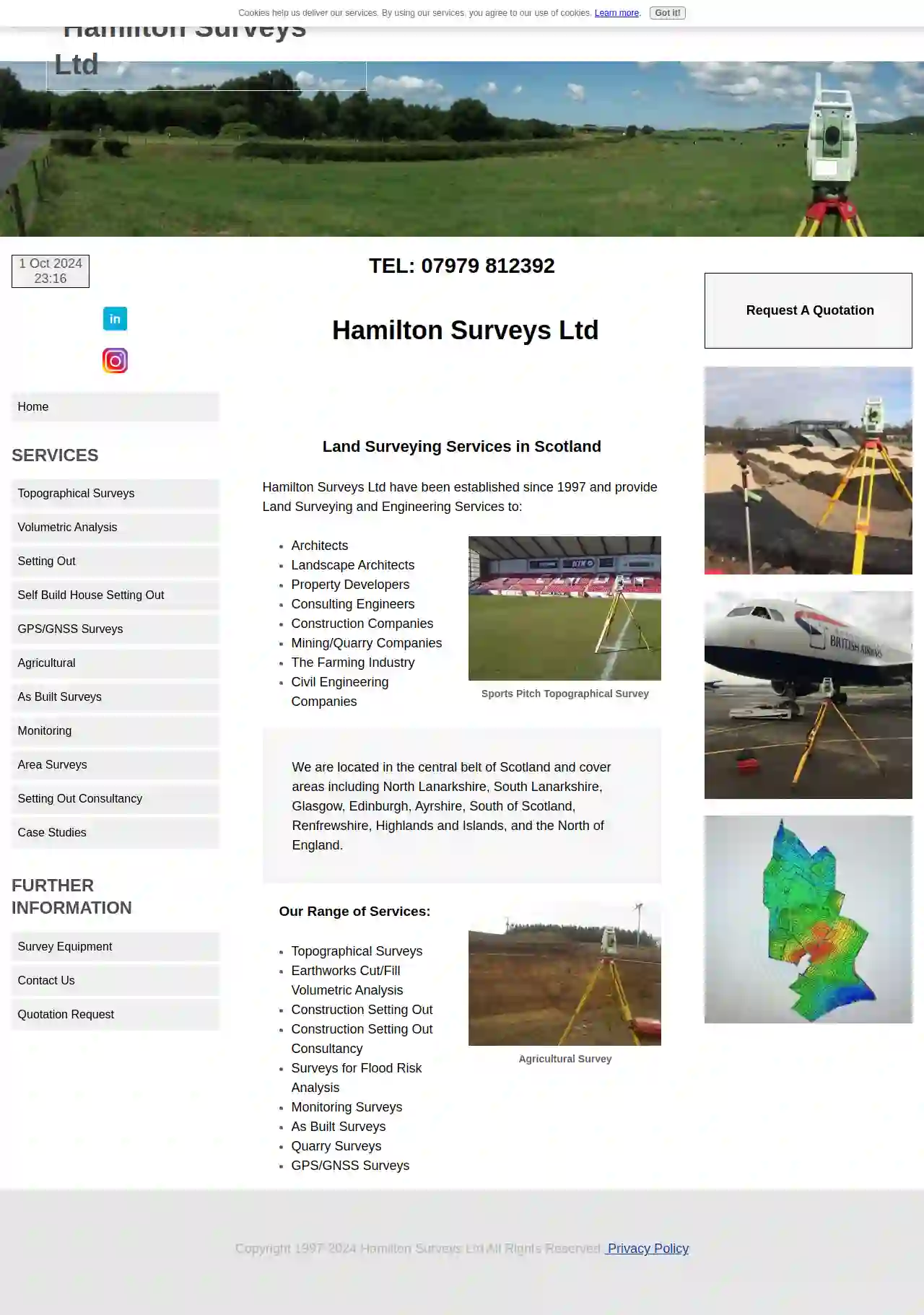Demolition Contractors High Blantyre
Top Building Demolition in High Blantyre
Receive up to 3 Local Demolition Contractors quotes for your project today! Compare profiles, reviews, accreditations, portfolio, etc... and choose the best service.

Hamilton Surveys Ltd
4.52 reviewsHamilton, GBHamilton Surveys Ltd Hamilton Surveys Ltd has been established since 1997 and provides Land Surveying and Engineering Services to a wide range of clients, including: Sports Pitch Topographical Survey Architects Landscape Architects Property Developers Consulting Engineers Construction Companies Mining/Quarry Companies The Farming Industry Civil Engineering Companies We are located in the central belt of Scotland and cover areas including North Lanarkshire, South Lanarkshire, Glasgow, Edinburgh, Ayrshire, South of Scotland, Renfrewshire, Highlands and Islands, and the North of England.
- Services
- Why Us?
- Gallery
Get Quote
Centra Tech Drainage LTD
59 reviewsHamilton, GBWelcome to Centra Tech Drainage Ltd Your Trusted Partner in Drainage Solutions We specialize in providing top quality drainage services to residential and commercial customers alike. Whether it’s dealing with clogged drains, slow drainage, or other issues, we’re here to help. Our team of experts is dedicated to providing fast, efficient, and reliable solutions to get your drainage system running smoothly again.
- Services
- Why Us?
- Gallery
Get Quote
MDS Landscape and Design Ltd
83 Gartloch Way, Gartcosh, G69 8FD, GBExperienced garden landscapers in Glasgow When it comes to garden landscaping and design, MDS Landscape and Design Ltd is the company to contact. If you are thinking of having your garden landscaped, get in touch by completing our contact form or giving us a call. Here at MDS Landscape and Design Ltd, we have more than 30 years of combined experience in garden landscaping, working with homeowners and commercial clients alike. Based in Glasgow, we work across a wide area, which includes Lanarkshire, West Lothian, Midlothian, and Renfrewshire. Our company is built on the foundation of customer satisfaction, and we approach each project with the same level of care and attention to detail that we would like for our own garden. Whatever type of hard or soft landscaping project you are considering, get in touch with us for a competitive quotation.
- Services
- Why Us?
- Testimonials
- Gallery
Get Quote
Burgh Resin Specialists
Hamilton, GBScotland's Epoxy Resin Surfacing Experts Burgh Resin Specialists are resin surface professionals providing resin bound driveways, rubber crumb flooring and Savoro flooring across Edinburgh, Glasgow, Falkirk, Fife and The Lothians. Working only with premium quality resins produced from traceable UK materials, we are experts in installing resin surfacing that outperforms any others on the market. We are Burgh Resin, specialist resin surfacing suppliers and installers working across Edinburgh, Glasgow, Falkirk, Fife and The Lothians, providing the strongest driveways, external and internal resin surfacing in the UK.
- Services
- Why Us?
- Gallery
Get Quote- Ta
Taylor Wimpey Oakwood Grove
41 reviewsHamilton, GB- Services
- Why Us?
Get Quote - Wi
William Shanks Construction
Hamilton, GB- Services
- Why Us?
Get Quote - No
Northlanarkshire Garden Care
52 reviewsHamilton, GB- Services
- Why Us?
Get Quote - J
J & J Ferguson Ltd
Hamilton, GB- Services
- Why Us?
Get Quote - (R
(Road Surfacing) (tarmac Driveways) Lanarkshire Glasgow. Wjt Trades Ltd
4.73 reviewsHamilton, GB- Services
- Why Us?
Get Quote - Dy
Dyno
Hamilton, GB- Services
- Why Us?
Get Quote
Over 13,059+ Excavation Contractors on our platform
Our excavation experts operate in High Blantyre and beyond!
ExcavationHQ has curated and vetted Top Excavation Pros arround High Blantyre. Find a top & trustworthy business today.
Frequently Asked Questions About Demolition Contractors
- Dust Suppression: Use water spraying, misting systems, or other dust suppression techniques to control airborne particles.
- Noise Barriers: Erect temporary noise barriers around the demolition site to reduce noise transmission to nearby properties.
- Work Schedule: Schedule noisy demolition activities during permitted hours to minimize disturbance to neighbors.
- Communication: Keep neighbors informed about the demolition schedule and any potential disruptions.
- Waste Generation: Demolition generates a large volume of debris, contributing to landfill space and potentially releasing harmful substances into the environment if not disposed of properly.
- Air Pollution: Dust and particulate matter released during demolition can impact air quality, affecting human health and the environment.
- Noise Pollution: Demolition activities can generate significant noise, disturbing nearby residents and wildlife.
- Resource Depletion: Demolition consumes resources that could be salvaged and reused, contributing to resource depletion and environmental degradation.
- Site Security: Secure the demolition site with fencing and warning signs to prevent unauthorized access.
- Personal Protective Equipment (PPE): Workers should wear appropriate PPE, including hard hats, safety glasses, gloves, and steel-toe boots.
- Hazardous Material Removal: Properly identify and remove asbestos, lead paint, or other hazardous materials before demolition begins.
- Utility Disconnections: Disconnect all utilities, such as electricity, gas, and water, before demolition.
- Controlled Demolition Techniques: Employ controlled demolition methods to minimize risks and ensure the structure comes down safely.
- Dust Control: Implement dust suppression measures, such as water spraying or misting, to reduce airborne particles and protect air quality.
- Emergency Planning: Have an emergency plan in place, including communication protocols and evacuation procedures, in case of unforeseen events.
How can I minimize the dust and noise from demolition?
How long does a demolition project take?
What are the environmental impacts of demolition?
What are the safety precautions for demolition?
How can I minimize the dust and noise from demolition?
- Dust Suppression: Use water spraying, misting systems, or other dust suppression techniques to control airborne particles.
- Noise Barriers: Erect temporary noise barriers around the demolition site to reduce noise transmission to nearby properties.
- Work Schedule: Schedule noisy demolition activities during permitted hours to minimize disturbance to neighbors.
- Communication: Keep neighbors informed about the demolition schedule and any potential disruptions.
How long does a demolition project take?
What are the environmental impacts of demolition?
- Waste Generation: Demolition generates a large volume of debris, contributing to landfill space and potentially releasing harmful substances into the environment if not disposed of properly.
- Air Pollution: Dust and particulate matter released during demolition can impact air quality, affecting human health and the environment.
- Noise Pollution: Demolition activities can generate significant noise, disturbing nearby residents and wildlife.
- Resource Depletion: Demolition consumes resources that could be salvaged and reused, contributing to resource depletion and environmental degradation.
What are the safety precautions for demolition?
- Site Security: Secure the demolition site with fencing and warning signs to prevent unauthorized access.
- Personal Protective Equipment (PPE): Workers should wear appropriate PPE, including hard hats, safety glasses, gloves, and steel-toe boots.
- Hazardous Material Removal: Properly identify and remove asbestos, lead paint, or other hazardous materials before demolition begins.
- Utility Disconnections: Disconnect all utilities, such as electricity, gas, and water, before demolition.
- Controlled Demolition Techniques: Employ controlled demolition methods to minimize risks and ensure the structure comes down safely.
- Dust Control: Implement dust suppression measures, such as water spraying or misting, to reduce airborne particles and protect air quality.
- Emergency Planning: Have an emergency plan in place, including communication protocols and evacuation procedures, in case of unforeseen events.